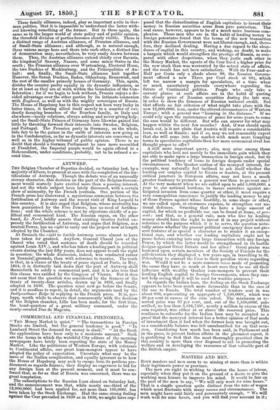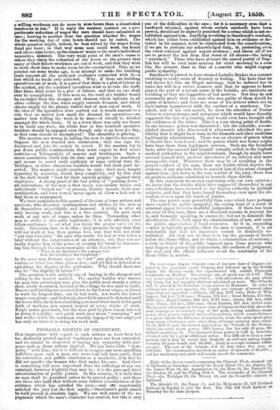MASTERS AND MEN.
BOTH masters and men seem to us aiming at more than is within their legitimate power or province. The men are right in wishing to shorten the hours of labour, especially when they put it on the ground of a desire to give the working man leisure to improve his mind. It would be fair on the part of the men to say, We will only work for nine hours." That is a simple question quite distinct from the rate of wages which must fluctuate with many causes and circumstances. The men might have said fairly and persuasively enough, We will work well for nine hours, and you will find your account in it; a willing workman can do more in nine hours than a dissatisfied bondsman in ten." If in reply the masters insisted on a pro- portionate reduction of wages the men should. have submitted at once ; leaving to another time the question whether the wages for the working day of nine hours should not be raised. The whole question might, indeed, be best solved by the wages being fixed per hour; in that way some men could work ten hours and others nine hours, as the masters' wants or the men's individual necessities dictated. The very weak point of the men's cause is where they claim the reduction of the hours on the ground that many of their fellow-workmen are out of work, and that they wish to work short time to make room for the unemployed. This, as we pointed out some weeks ago, is an attempt to make the building trade support all the profe3sed craftsmen connected with it—a feat which no trade ever achieved. Why, if there are building operatives out of work, it is a proof that there is a gent of labour in the market, yet the combined operatives wish so to rale the trade that there shall never be a glut of labour, and that no one shall ever be unemployed. If this were so, the craft of a builder would be excluded from the changes and chances which indicate in all other callings the time when supply exceeds demand, and which checks supply by the plainly visible fact of men out of work. If the idea of the operatives were carried out it would amount to a rule that no matter how small the demand for operatives—no matter how trifling the work to be done—it should be divided amongst the whole trade. If in a town there was only one house to be built one week, the whole four or five hundred operative builders should be engaged even though only at an hour per day, so that none should be unemployed! The absurdity is glaring.
The masters are wrong in asking the men to sign the document. Suppose the men starved into submission ; they can sign the document and join the society in secret. If the masters try to put down public combinations they must expect to find secret societies—a Vehmgericht of masons and bricklayers. Such a secret association could bide its time and prepare its machinery and means in secret until suddenly at some critical time the Trollopes, or other obnoxious builders would find their yard de- serted. The masters might combine in vain ; their men, taught hypocrisy by necessity, would deny complicity, and by this stab in the dark would "feed fat their ancient grudge" against their employers. A strong proof of the bad policy of "putting down " all associations of the men is that many non-society trades and individuals " locked out" at present, bitterly lament their non- combination, and have vowed never again to allow a lock out to find them so unprepared. We most complain in this quarrel of the tone of some writers and speakers, who denounce combinations and strikes by the men as in themselves unjustifiable and immoral. A strike is after all only leaving work, and this is a free country. No man need work at any rate of wages unless he likes. Persuading other men to strike is also quite legitimate ; it is only advising your fellow-craftsman to set what you think the proper value on his work. Barristers dare to do this ; they presume to say that they will not work at less than guinea fees, and they will not alone "put into Coventry" the man who works for less or who takes a brief without the intervention of an attorney, but they can ac- tually deprive him of his power of earning his bread by denounc- ing him through the instrumentality of the Benchers-
" What in the Barrister's but a proper rule
Is in the bricklayer flat blasphemy."
In the same way Doctors agree to " cut " any physician who ad- vertises or takes less than guinea fees ; and yet this is defended as upholding the dignity of the profession. Why should there not also be " the dignity of labour ? " The question is not entirely one of buying in the cheapest and selling in the dearest market. The master builder who starves his men into submission may give the public next month a rotten shed, nicely decorated, instead of the cottage he was paid to build. Masons and bricklayers screwed down to the lowest wages, or forced to work the longest time, can do bad work, not worth the lowest wages ever given—and bad work also which cannot be detected until the house falls, for in housebuilding you must trust much to the good faith of workers, you cannot inspect at every stroke of work. People praise piecework, but the man paid by piece has an interest in doing it quickly ; and quick work may mean " scamping " and bad work—while the workman steadily engaged by one employer has only an interest in doing his work well.



























 Previous page
Previous page